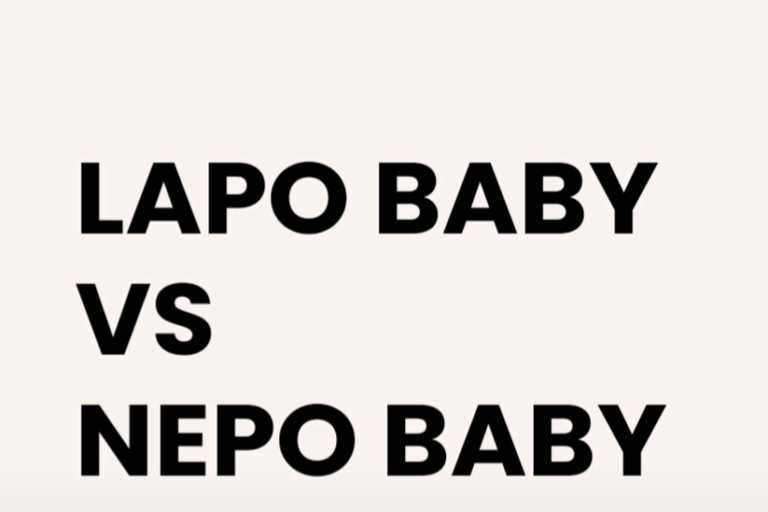Last week, social media exploded with a debate that was equal parts hilarious and eye-opening: ‘Nepo babies’ vs. ‘Lapo babies.’ What began as harmless internet humour, memes comparing kids eating jollof rice in luxury restaurants with those eating eba on plastic plates quickly revealed a deeper truth.
Beneath the laughs was a global conversation about privilege, parenting, and what success truly means in an unequal world.
What Do ‘Nepo’ and ‘Lapo’ Even Mean?
“Nepo baby” is shorthand for “Numerous Endless Privileges & Opportunities.” These are children born into wealth, status, or powerful connections—kids whose parents open doors before they even knock. They’re enrolled in elite schools, secure internships with ease, and have safety nets to catch them when they stumble.
“Lapo baby” stands for “Little Access to Privileges & Opportunities.” These are the hustlers—the underdogs. The name is a witty nod to a Nigerian microfinance bank, symbolising scrappy beginnings and financial grind. Lapo babies grow up walking miles to school, mastering skills on outdated tech, and learning survival early. Their margin for error is tiny, but their resilience is unmatched.
Why the Debate Resonated Globally
This wasn’t just a Nigerian joke. It resonated worldwide because it challenged the myth of pure meritocracy. We love rags-to-riches stories, but the truth is: no one chooses their starting line in life.
Privilege can be invisible when you have it. And when you don’t, society often blames you for not succeeding fast enough. As Chimamanda Adichie said, “Privilege blinds because it is the nature of privilege to blind.”
This viral moment exposed a raw truth: effort matters, but access matters more.
Parenting in the Age of Privilege and Pressure
The discourse forced many parents to reflect. If you have the means, of course you want to help your child. But how much help is too much? And if you don’t have those means, how do you empower your child regardless?
Wealthy parents may unintentionally stifle independence by over-managing their children’s lives. Meanwhile, less privileged parents may offer freedom by necessity but lack access to opportunities.
Research shows that the best parenting blends support and autonomy: being involved, but not scripting your child’s entire life.
What the Labels Don’t Tell You
Not all Nepo babies are entitled. Not all Lapo babies are hardened. Success and failure are rarely black and white.
Four common myths this debate debunks:
1. Hard work guarantees success – It doesn’t.
2. Success equals merit – Many got help along the way.
3. Struggle equals virtue – Hardship builds grit, but also trauma.
4. Your fate is fixed by birth – Birth matters, but so do mentors, timing, and choices.
What Parents Can Actually Do
For Nepo babies: Teach gratitude, talk about privilege, let them fail safely, and encourage them to uplift others.
For Lapo babies: Seek free or low-cost opportunities, foster self-belief, and celebrate small wins.
For all kids: Give them roots and wings—a support system and the freedom to explore.
The Bigger Picture: Systems and Stories
Structural inequality can’t be ignored. Hustle alone won’t replace fair policies, quality education, or inclusive hiring.
Let’s also change how we define success. A child who learns a trade or uplifts their community has succeeded, too.
Beyond Nepo and Lapo: A Call for Empathy and Agency
Ultimately, this is bigger than labels. It’s about how we define success and share opportunities.
Let’s teach Nepo kids to use privilege responsibly. Let’s empower Lapo kids to dream without limits. Let’s raise all children with a strong internal compass, not just a mapped-out route.
Because real empowerment isn’t about giving kids directions, it’s about helping them navigate the world with confidence.
Culled from TheCable











